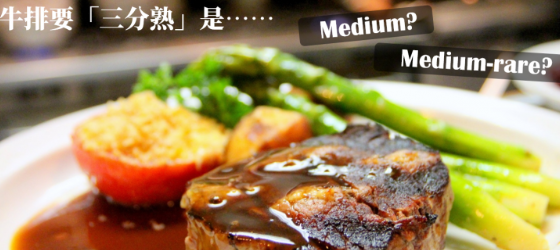Sofia 办理完饭店的入住后 (如何用英文办理入住?请见来人,帮本宫订房!娘娘您要的是 room 还是 suite?),决定前往饭店的餐厅。
她早就听说这家饭店的牛排特别好吃了!来吧,跟着 Sofia 前去餐厅!
(Sofia sits down and calls for a server.)
(Sofia 坐下然后叫来一位服务生。)
Server: Good day, ma’am. I will be your server today. What would you like to order?
服务生:日安,女士。我今日为您服务。您想点些什么呢?
Sofia: I’ve heard that the steak here comes highly recommended, and I’d like to see for myself if it lives up to the hype. I’ll have the filet steak.
Sofia:我听说你们这里的牛排很推 … 好吧,让我来看看真假。我要一份菲力牛排。
Server: Certainly, ma’am. How would you like your steak done?
服务生:没问题,女士。您的牛排要几分熟?
Sofia: Medium-well please.
Sofia:麻烦七分熟。
Server: What sauce would you like?
服务生:您想要哪种酱汁?
Sofia: What would you recommend?
Sofia:你推荐哪种?
Server: I’d recommend the red wine sauce or the garlic butter sauce.
服务生:我推荐红酒酱和大蒜奶油酱。

Sofia: Garlic? Bleurgh! I hate garlic. I’ll have the red wine sauce.
Sofia:大蒜?恶!我讨厌大蒜。我要红酒酱。
Server: No problem. Would you like something to drink?
服务生:没问题。您想点些饮品吗?
Sofia: A glass of Cabernet Sauvignon.
Sofia:一杯卡本内苏维浓。
Server: Sure. I’ll be back with your order soon.
服务生:好的。我将很快送上您的餐点。
server (n.) 服务生
server 等同于 waiter,意思都是「服务生」。 server 源自于动词 serve,意思是「服侍」。
The server tripped and spilled juice all over the table.
服务生绊了一跤,把果汁都洒到了桌上。
How would you like your steak? 你的牛排要几分熟?
服务生绝对不是在问你「你喜欢你的牛排吗?」,而是在问你「你的牛排要几分熟?」
这句话原先完整的句子是 How would you like your steak cooked/done?,后头接的动词 cooked 和 done 为过去分词,整句话直翻的意思为「你想要你的牛排被如何料理 / 煎多熟?」
medium (adj.) 五分熟
medium-rare (adj.) 三分熟的
medium-well (adj.) 七分熟的
medium 为「五分熟」,它本来就能拿来指「适中的;中等的;中等熟度的」。后头加个 well 等于加了两分熟度,变成 medium-well「七分熟」;加上 rare 则是减去两分熟度,变成 medium-rare「三分熟」,rare 指「半熟的;稀罕的;稀疏的」。
Medium-well steak will have a hint of pink inside.
七分熟的牛排内部会呈现些微地淡粉色。
sauce (n.) 酱汁
所以我说那个酱汁呢? sauce 就是「酱汁」,比如:tomato sauce (番茄酱)、chili sauce (辣椒酱)、basil pesto sauce (罗勒青酱)、savory sauce (咸酱)、sweet sauce (填酱)、soy sauce (酱油)。
My sister prefers eating fries with tomato sauce but I prefer garlic sauce.
我姐姐吃薯条偏好沾番茄酱,但我比较喜欢大蒜酱。
牛排来啦!来听听 Sofia 是怎么评价的?
Sofia: (cutting the steak) this is not what I ordered! Server!
Sofia:(切牛排) … 这不是我点的啊!服务生!
Server: (coming) Yes ma’am?
Server:(前来) 女士,有何吩咐?
Sofia: I ordered a medium-well steak, but this is clearly well-done!
Sofia:我点的是七分熟的牛排,但这显然是全熟!
Server: There seems to have been a mistake. I do apologize.
服务生:看来出错了。我为此致歉。
Sofia: Of course you should apologize.
Sofia:你是该抱歉。
Server: Please allow me to ask the chef to make you another one.
服务生:请让我去请大厨重做一份。
Sofia: (sigh) Go.
Sofia:(叹气) 去吧。
(After 20 minutes, the server comes back with a fresh steak.)
(二十分钟后,服务生端来了新一盘牛排。)
Server: Ma’am, I sincerely apologize for our mistake. This time we’ve made sure it is medium-well.
服务生:女士,我为我们的错诚挚向您致歉。这一次我们很肯定是七分熟。
Sofia: It’d better be. (Cutting and having a bite) Mmm… well, you do cook a very good steak.
Sofia:最好如此。 (切了一口放进嘴) 嗯… 这个嘛,你们的确是很会煎牛排。
Server: Thank you for your praise, ma’am. To compensate for our mistake, we would like to offer you dessert on the house.
服务生:感谢您的美言,女士。为了弥补我们的错误,我们想提供您一份甜点。本店招待。
太不专业了!竟然会做错餐点,不过 Sofia 因此得到了一份免费招代的甜点,也算因祸得福哦!来复习单字吧!
well-done (adj.) 全熟的
well-done 为形容词,指牛排「全熟的」。你或许听过某人对你说 Well done! 那不是在说你熟透了,而是在称赞你「做得好」!
Well-done steak looks brownish inside.
全熟的牛排内部呈现棕色
Well done son! You’ve done so well on your test!
做得好啊,儿子!你考试考得真好!
compensate (v.) 弥补
compensate 意指「弥补;补偿;赔偿」,常搭配介系词 for 表示为了某事物所做的补偿。
Jimmy binge watched the series on Netflix to compensate for missing it while preparing for the college entrance exam.
Jimmy 狂看 Netflix,弥补他准备大学入学考试期间错过的影集。
on the house (phr.) 店家招待
听到 on the house 时你就要开心了!注意:这句话不能从字面解读为「在屋子上」,而是指「店家招待」!其中 house 指的是「店家」、「商家」。
The soup is on the house; you won’t need to pay for it.
汤是店家招待的,你不需要付。







